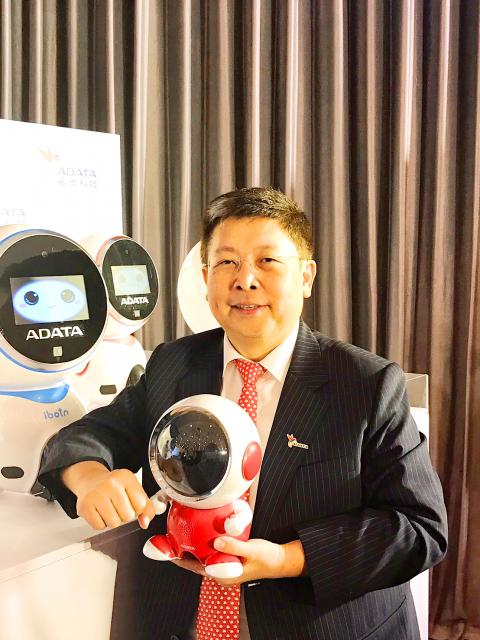Adata Technology Co (威剛科技), the nation’s biggest DRAM module supplier, yesterday said net profit tumbled about 60 percent last quarter from a quarter ago, as memory chip price hikes subsided due to seasonal slack PC demand.
Net profit sank to NT$310 million (US$10.3 million) during the quarter ending June 30, compared with NT$778 million in the first quarter, while earnings per share fell to NT$1.42 from NT$0.41.
The company’s gross margin shrank 11.26 percent last quarter, from 18.19 percent in the first quarter of the year.

Photo: Hung Yu-fang, Taipei Times
However, the company said it expects a quick recovery this quarter, supported by constrained supply of DRAM and NAND flash modules.
Supply of NAND flash memory chips might further be capped by the slow ramp-up of new 3D NAND flash memory chip production by major global suppliers, Adata said.
“The company has hit bottom in the second quarter in terms of profitability,” Adata said in a company statement. “Profits in the third quarter will be better than in the second quarter.”
The company forecast that short supply of DRAM chips would prompt a new wave of price hikes of perhaps more than 10 percent quarter-on-quarter this quarter, as seasonal demand picks up after a short break in the second quarter.
Net profit in the first half of the year more than quadrupled year-on-year to NT$1.1 billion, from NT$208.46 million in the same period last year. Earnings per share also rose to NT$5.04 from NT$0.97.
Gross margin improved to 14.82 percent in the first half, from 7 percent in the previous year.
Adata yesterday posted 4.72 percent drop in revenue for last month at NT$2.62 billion from NT$2.75 billion in June. That represented an annual growth of 45.44 percent from NT$1.8 billion.
DRAM modules accounted for 53.9 percent of last month’s overall revenue, while NAND flash memory modules made up 21.9 percent, the company said.

CHIP RACE: Three years of overbroad export controls drove foreign competitors to pursue their own AI chips, and ‘cost US taxpayers billions of dollars,’ Nvidia said China has figured out the US strategy for allowing it to buy Nvidia Corp’s H200s and is rejecting the artificial intelligence (AI) chip in favor of domestically developed semiconductors, White House AI adviser David Sacks said, citing news reports. US President Donald Trump on Monday said that he would allow shipments of Nvidia’s H200 chips to China, part of an administration effort backed by Sacks to challenge Chinese tech champions such as Huawei Technologies Co (華為) by bringing US competition to their home market. On Friday, Sacks signaled that he was uncertain about whether that approach would work. “They’re rejecting our chips,” Sacks

It is challenging to build infrastructure in much of Europe. Constrained budgets and polarized politics tend to undermine long-term projects, forcing officials to react to emergencies rather than plan for the future. Not in Austria. Today, the country is to officially open its Koralmbahn tunnel, the 5.9 billion euro (US$6.9 billion) centerpiece of a groundbreaking new railway that will eventually run from Poland’s Baltic coast to the Adriatic Sea, transforming travel within Austria and positioning the Alpine nation at the forefront of logistics in Europe. “It is Austria’s biggest socio-economic experiment in over a century,” said Eric Kirschner, an economist at Graz-based Joanneum

BUBBLE? Only a handful of companies are seeing rapid revenue growth and higher valuations, and it is not enough to call the AI trend a transformation, an analyst said Artificial intelligence (AI) is entering a more challenging phase next year as companies move beyond experimentation and begin demanding clear financial returns from a technology that has delivered big gains to only a small group of early adopters, PricewaterhouseCoopers (PwC) Taiwan said yesterday. Most organizations have been able to justify AI investments through cost recovery or modest efficiency gains, but few have achieved meaningful revenue growth or long-term competitive advantage, the consultancy said in its 2026 AI Business Predictions report. This growing performance gap is forcing executives to reconsider how AI is deployed across their organizations, it said. “Many companies

France is developing domestic production of electric vehicle (EV) batteries with an eye on industrial independence, but Asian experts are proving key in launching operations. In the Verkor factory outside the northern city of Dunkirk, which was inaugurated on Thursday, foreign specialists, notably from South Korea and Malaysia, are training the local staff. Verkor is the third battery gigafactory to open in northern France in a region that has become known as “Battery Valley.” At the Automotive Energy Supply Corp (AESC) factory near the city of Douai, where production has been under way for several months, Chinese engineers and technicians supervise French recruits. “They